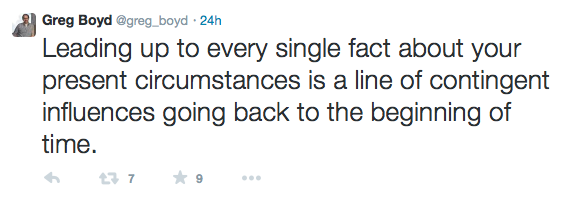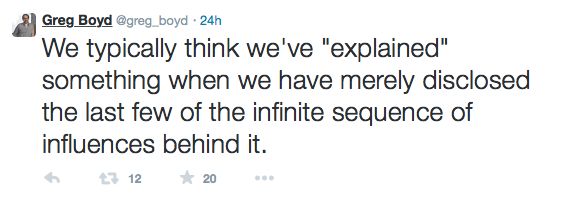We run our website the way we wished the whole internet worked: we provide high quality original content with no ads. We are funded solely by your direct support. Please consider supporting this project.
Why? The Question That Cannot Be Answered
Yesterday Greg sent out the following flurry of tweets:





To provide some background to these tweets, the following illustration will prove helpful:
They mystery of evil and an eight-second interval
Let’s assume that there is an eight-second interval between two cars. Now let’s try to explain why there is this eight-second interval at this particular time and place. To assess this we would need to acquire an exhaustive knowledge of all the factors that led these two drivers to be on that freeway at just that moment, driving at just that speed. Had anything been different that day for either driver, the interval might have been longer or shorter—or perhaps nonexistent. The interval between these two cars was also affected by the speed of all the other drivers on the freeway at that time and before. Thus we would also have to acquire an exhaustive knowledge of all the factors that influenced all the drivers on the freeway that day, driving the exact speed they were driving.
We have not yet arrived at the initial conditions explaining the eight-second interval, however, for one cannot exhaustively understand the behavior of any driver on the freeway on this particular day without understanding all the factors that influenced this behavior on the previous day, week, months and years. Had anything been different—a career choice, a marriage choice, an unplanned pregnancy, an ice storm that altered the lives of a certain driver’s parents in 1942—the eight-second interval may have been different. To understand such matters, we would have to consider all the variables that influenced everyone who ever influenced the drivers on the road that day, as well as the variables that influenced people who might have been on the road had things turned out differently. Every person, every decision, every physical and spiritual factor through history that exercised any influence on creating this eight-second interval would have to be fully understood if the interval was to be exhaustively explained.
Attaining anything like this understanding is obviously impossible for finite human beings. Thus we must conclude that we simply cannot know in any exhaustive sense why there was an eight-second interval between two given cars instead of a nine- or seven-second interval or no interval at all.
The same might be said for every contingent feature of our world. Why is a particular insect flying in a particular pattern in this particular place at this particular time? Why does a particular tornado destroy a particular house and not a different house? Why does a particular stock go up to a certain level at a particular time and down to a certain level at a different time? We can specify the kind of things that explain these facts, but we will never exhaustively explain the particular facts themselves.
The mystery of why a particular child is abducted by a particular person at a particular time is no more or less mysterious than this. Here too we can specify the kind of things that explain these kinds of events, but we cannot explain any of their particularities. It is the direct result of a person’s free will and the indirect result of innumerable other human and spiritual free wills. Beyond this, however, we can say little.
It is enough for us to know that this mystery is not about God but about creation. Among the few things we can know with certainty is that God’s character is unequivocally loving, holy and good, for he is clearly revealed in the person of Jesus Christ. Thus we can know that he revolts against this and all other forms of evil.
—Adapted from Satan and the Problem of Evil, pages 218-220
Category: General
Tags: Complexity, Mystery, Problem of Evil, Theodicy
Topics: The Problem of Evil
Related Reading

Lord Willing? Part 2
In Part 2 of Greg’s interview of Jessica Kelley about her book Lord Willing?, they discuss the theology that helped Jessica through her son Henry’s illness and death. You can find Part 1 of the interview here, and part 3 here.

Satan and the Corruption of Nature: Seven Arguments
Man…trusted God was love indeed And love Creation’s final law – Tho’ Nature, red in tooth and claw With ravine, shrek’d against his creed” —Tennyson, In Memoriam Tennyson nailed it. We trust that God is love, but we also believe that God is the Creator of nature, and nature simply does not seem to point…

Is God Good?
Andrew Stawarz via Compfight This reflection by David D. Flowers seemed like a good addition to Greg’s recent blogs on free will. Here David talks about the problem of evil and how it is that we can call God “good” in light of a world full of evil. He even quotes Greg extensively. From the…

Some Questions a Year After Her Child’s Death
Jessica Kelley wrote a post for The Jesus Event that we wanted to share with you. You might remember that last year we were getting to know Jessica as she lost her four year old son Henry just before Christmas. In this post, she reflects on the theology of the people around her concerning her son’s death. She has…

Henry’s Mom: Did God Author This?
Many of you were touched last month when we featured some reflections on little Henry’s death. Well, Henry’s mother Jess has started a blog to process through some of her thoughts and we wanted to share this amazing piece with all of you. Jess thinks ahead to the time when her two-year-old daughter will start…

Why We Can’t Know Why Bad Things Happen
Science has demonstrated that the slightest variation in a sufficiently complex process at one point may cause remarkable variations in that process at another point. It’s called chaos theory. The flap of a butterfly wing in one part of the globe can be, under the right conditions, the deciding variable that brings about a hurricane…

